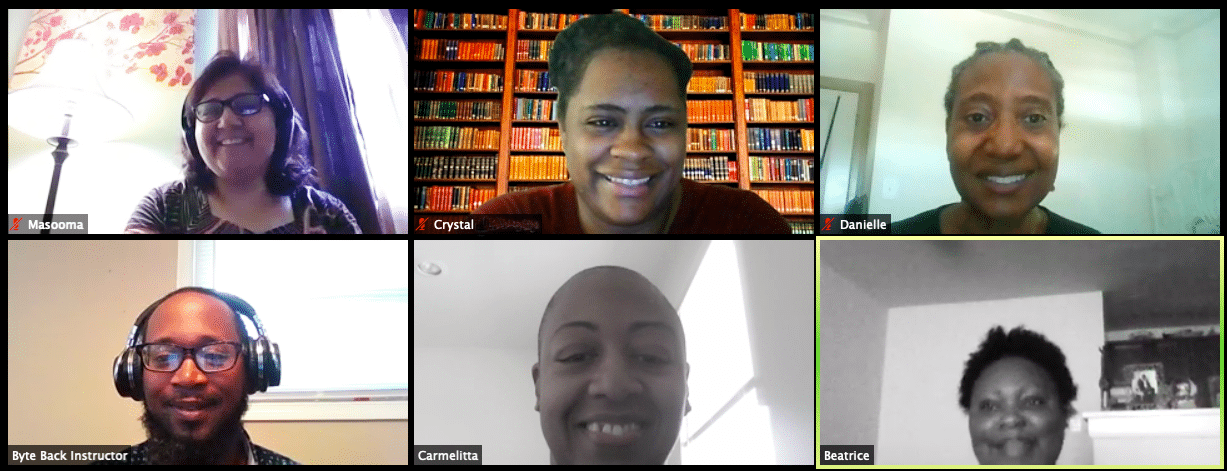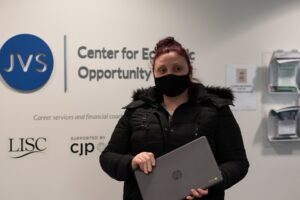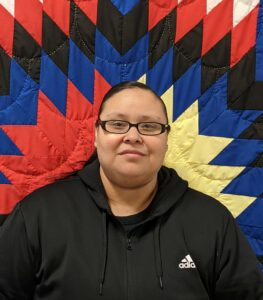Digital Navigation services have been evolving since March 2020 in a variety of settings. Read about program implementations within diverse contexts – adult education and training agencies, community college, and at state and city levels.
Read about how programs in diverse contexts are implementing and instituting Digital Navigator services
Digital Navigation services have been evolving since March 2020 in a variety of settings. Read about program implementations within diverse contexts – adult education and training agencies, community college, and at state and city levels.
Byte Back has long been a leader in providing free digital skills, IT certification, and career advancement opportunities in the Washington DC and Baltimore area, and especially for Black residents and women.
However, faced with declining attendance during the pandemic, Byte Back developed a Digital Navigator program in late 2020 with support from DigitalUS. As Byte Back had a network of students and alumni from Byte Back’s certification program who were already familiarized with technology, it was able to deploy them as Navigators. The hands-on experience helps Byte Back Navigators jumpstart their tech careers or gain new skills while benefiting the community.
At first, the Navigators assisted Byte Back students with their technical problems. For instance, if a student did not have a computer, the Navigator would guide them through Byte Back’s computer loaner program. In addition, the Navigators help the students with troubleshooting software, a vital component for participating in online classes. Recently, their job responsibilities expanded as WildTech partnered with Byte Back to support senior citizens who were learning digital literacy in the DC area.
Having seen the value and impact of Digital Navigator services, Byte Back now advocates for more funding for organizations to hire staff to coordinate and support more volunteers, fellows, or staff to serve as Navigators. It also advocates for more equipment—such as having more computers to loan to their students and community members.

Byte Back Computer Foundations learners in Baltimore gained essential skills through the pandemic, thanks to help from Digital Navigators, who helped them access a computer, get online, and use Zoom
The COVID-19 pandemic catalyzed the ExCITe (Expressive & Creative Interaction Technologies) Center at Drexel University to address Philadelphia’s digital divides that cut deeply across racial and economic lines.
With guidance from Philadelphia’s Office of Innovation and Technology and funding from Digital Literacy Alliance, the ExCITe Center, along with five other programs, aims to mitigate the technological gap in Philadelphia. The ExCITe Center has its primary focus in the West Philadelphia Promise Zone—high poverty neighborhoods in West Philadelphia designated by the U.S Department House and Urban Development (HUD) as needing assistance to improve the quality of life. Nevertheless, the Center strives to help as many people as they can regardless of where they are calling in from to receive Digital Navigator services.
At the start of the pandemic, Digital Navigators primarily assisted Philadelphians with internet access, ranging from finding low-cost internet plans to informing them about hotspots within the community or through their mobile devices. Mostly Drexel University undergraduate students, the Navigators are trained through guides and presentations in order to handle most of the situations that arise. Whenever they come across a situation that they do not know the answer to, Navigators have each other to lean on. As of April 2021, this program has trained over thirteen Navigators.
After running for an entire year, the program has evolved to address persistent inequities in computer access. The program works with other non-profit organizations—including People’s Emergency Center, NerdIT, and Drexel’s Computer Recycling program—to collect, refurbish, and distribute computers to the community at no cost. It has distributed over 80 computers to the community. Furthermore, the Center also worked with University of Pennsylvania students to fundraise over $3,000 for headsets and web cameras.
Drexel’s Digital Navigator program has been able to help over 200 people throughout the community, and counting. Going forward, the program is focusing on outreach and raising community awareness of the program in order to serve a wider demographic. They have gone to multiple community meetings to hear about the issues the city is currently facing and services provided and look for ways to embed Digital Navigator services into them. Hence, when they are not distributing computers, they assist the community with kindergarten registration, vaccine registration, as well as finding computer training classes.
JVS Boston, one of the largest workforce development organizations in New England, developed a Digital Navigator program early in the COVID-19 pandemic when many of their students had trouble using communication apps like Zoom and WhatsApp, and some lacked internet access and devices.
Jewish Vocational Service (JVS) was founded amidst the Great Depression to assist Jewish immigrants to enter the American workforce to support their families. Over the years, JVS expanded their scope to serve immigrants from over 103 nations with education, skills, and employment.
By summer 2020, as the attendance in some of their classes began to decline, JVS started having trained, mostly bilingual, Digital Navigators attend trainings to help students remotely to onboard to using apps through a variety of ways, such as one-on-one sessions after class or during class in a breakout room. Navigators assist students with day-to-day digital inclusion problems and also coach them on how to use the programs more proficiently to learn. Navigators are evolving to become classroom assistants, having an even more direct role in the students’ learning. Navigators are given access to training materials to reference when needed. In addition, in order to make the material more accessible, JVS began to create training videos.

photo: JVS Boston
The state of Minnesota’s shift from a largely agricultural economy and large number of retirements from the baby-boomer generation has created a shortage of higher-level skilled workers. To combat this issue, Literacy Minnesota created an Adult Basic Education (ABE), a program that offers a wide selection of free courses to increase employability. To better help Minnesotans during the pandemic, Literacy Minnesota developed Digital Navigator services to promote digital equity.
Literacy Minnesota runs its Digital Navigator program at its six Open Learning Centers that offer basic skills classes for adults. The Digital Navigators help learners with basic digital literacy skills, such as using an electronic device, accessing the internet, using Zoom for their classes, and finding resources suited for their needs. Because of its success, Literacy Minnesota partnered in the creation of TechPak with PCs For People, Ramsey County, Tech Dump and the Saint Paul Public Library to provide laptops, internet, and digital literacy training to Ramsey County residents. Through Techpak, the Navigators managed computer pick-ups, referrals of participants to ABE classes, and other supports.
Furthermore, Literacy Minnesota offers digital literacy assessments and lessons through Northstar Digital Literacy, an assessment open to anyone online. Users can evaluate their strengths and weaknesses in digital literacy and build their skills either online or at one of their 1,300 Northstar Locations, and earn a certificate to show proficiency.
Literacy Minnesota leverages volunteers to increase its impact. They provide training to prepare volunteers, including Digital Navigators, and make sure that one feels comfortable with the role picked. This investment, says a supervisor with Literacy Minnesota, is worth it as volunteers are “essential to the success of our programming by strengthening our ability to reach learners.”
Sitting Bull College serves as the primary post-secondary educational institution on the Standing Rock Reservation located in southern North Dakota and northern South Dakota. It was founded by the Standing Rock Sioux tribe in 1973.
The GED program within the tribal college serves about 100 learners every year. Due to the pandemic, the program had to rapidly shift to an all-online format. This shift has been challenging for learners who did not have comfort with working with technology and learning online.
Sitting Bull College’s Digital Navigator program is leveraging AmeriCorps members to assist learners pursuing GED preparation online. Their Digital Navigators support learners to onboard to loaner devices, set up emails, and familiarize them with software and online programs such as Microsoft Office.
 The impact of this critical work is evidenced in the words of JoRena LaFramboise, one of the learners, “I never knew much about the basics of a computer until I started working with the GED program. Coming to the GED program as a student and working with a computer, I have learned how to file, e-mail and schedule using the data and template apps. I am very grateful for all the support I got from the GED program.”
The impact of this critical work is evidenced in the words of JoRena LaFramboise, one of the learners, “I never knew much about the basics of a computer until I started working with the GED program. Coming to the GED program as a student and working with a computer, I have learned how to file, e-mail and schedule using the data and template apps. I am very grateful for all the support I got from the GED program.”
Sitting Bull College is a member of the American Indian Higher Education Consortium (AIHEC) and looks to share its experience and learnings implementing Digital Navigator services with more institutions to improve student success and opportunity.